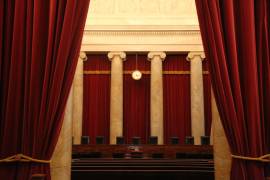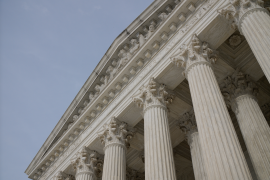Written by Eric Lesh
This week, Donald Trump’s nominee to the U.S. Court of Appeals for the Eighth Circuit, Minnesota Supreme Court Justice David Stras, had a hearing before the Senate Judiciary Committee. Like all of Trump’s extreme judicial nominees, Justice Stras presented himself to the members of the Senate Judiciary Committee as being capable of immediately relinquishing his longstanding anti-LGBT animus in order to become an impartial administrator of the law.
His record and judicial philosophy indicate otherwise.
Justice Stras’s record raises serious concerns about his willingness to comply fully with the rulings in many of the Supreme Court’s landmark LGBT rights decisions.
For example, Justice Stras has suggested that U.S. Supreme Court inappropriately “ventured” into addressing constitutional issues regarding marriage equality, dismissing constitutional protections for LGBT people as “social policy.” In that same 2008 article, Justice Stras expressed doubt about the core holding of Lawrence v. Texas, the 2003 ruling that struck down Texas’s sodomy law as an unconstitutional deprivation of liberty. Justice Stras seemed to dismiss the well-established fundamental rights of liberty, privacy and self-determination at the core of the ruling when he noted that sodomy bans violated privacy rights, at least “according to the Court.”
Justice Stras’s own campaign website acknowledges his deference to “laws passed under the political process,” rather than what he characterizes as “political leanings or personal preferences” of judges. This restrictive vision of the role of the courts tells vulnerable groups that, rather than turning to the Constitution, they must depend on the whims of governing majorities in order to vindicate their rights.
Justice Stras’s views of the role of the courts and the rights of LGBT people shines through in his judicial opinions.
For instance, Justice Stras joined an opinion that allowed a highly misleading characterization of the 2012 anti-LGBT Minnesota Marriage Amendment referendum to appear by holding that the Minnesota Legislature has the authority to override the judgment of the Minnesota Secretary of State no matter how inaccurate or misleading the title is, even though the Secretary of State had a statutory duty to ensure that titles reflected the actual content of the measure.. The Legislature’s title misleadingly stated—“Recognition of Marriage Solely Between One Man and One Woman”—rather than the Secretary of State’s title—“Limiting the Status of Marriage to Opposite Sex Couples.”
The dissenting Justices noted that the statute clearly required the Secretary of State to provide an appropriate title and that the decision expanded the limited role of the legislature– a revealing result for a judge, like Justice Stras, who has been praised for his “consistent record of using a textualist/originalist approach” to statutory interpretation.
Justice Stras is on Trump’s Supreme Court nominee shortlist.
Justice Stras’s name appeared along with Justice Neil Gorsuch on Donald Trump’s list of potential Supreme Court nominees. One of the key litmus tests that Mr. Trump articulated at the time was appointing justices who would overturn Roe v. Wade. His confirmation nomination will be rightly understood as a threat not only to Roe but also to the LGBT cases that were built upon Roe’s foundation.
Justice David Stras’s appointment to the federal bench would cause grave harm to the LGBT community, as well as many other communities who rely on the federal judiciary to administer fair and impartial justice.
Justice Stras’s extreme views and poor civil rights record were a cause for grave concern when his nomination was made. The White House should have consulted with Minnesota’s two home-state Senators before putting a nominee forward.
We urge you to stand with Lambda Legal to demand that his nomination be forever blocked.





